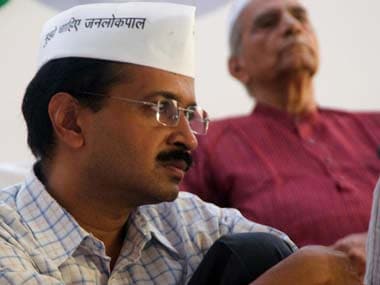As the old adage goes, God is in the details. And the details are dangerous. From the time the Aam Aadmi Party has been formed, the political novice has been churning out headline after headline, but little or no body copy. That worked. Who didn’t want to read or hear headlines that said that the AAP would eradicate corruption, ensure water for all, house the homeless, bring down electricity tariffs, punish corrupt politicians and bureaucrats alike, and so on. The AAP didn’t get into cumbersome details; they remained delightfully vague on how these promises would be kept. [caption id=“attachment_131341” align=“alignleft” width=“380”]  Arvind Kejriwal[/caption] As long as the headlines remained headlines, there was a wonderful warmth that these messages sent out; warmth that promised hope, of a better future for all Indians and India alike. It was difficult, in public, to argue against Arvind Kejriwal or the AAP. How could one, how dare one, not support someone with such selfless and generous objectives? There was no basis on which to debate or argue as there were no facts, numbers and details that one could win or lose arguments with. In short, everything was emotional. And as long as things stayed emotional, not a word could be said against the AAP. It’s in the last few days that the AAP has decided to take the plunge and reveal details. For example, we now know that the AAP is opposed to nuclear power in general and the Kudankulam project in specific. We know that the AAP has assured every Delhi family 700 litres of water everyday, free of cost. And once the AAP gets into specifics, they lose the protection afforded by the emotion-only argument and come to the dangerous area of the rational argument. “Even 50 LCPD (litres per capita per day) is sufficient. The idea of free water is unsustainable. It should be subsidized but not free. There will be wastage if it’s free. The objective of supplying equitable amounts of water to the needy will be defeated," says Manoj Misra of Yamuna Jiye Abhiyan. Perhaps the AAP is committed to all that they have promised – and perhaps they would have attempted to deliver on their promises. But, considering the composition of the Delhi Assembly, in which the AAP clearly needs the Congress support on pushing through anything that is contentious, they will fail. If the AAP had a clear majority, they could have attempted to push through all kinds of legislation and policy without being hamstrung by coalition partners. As things stand, there is a limit to what they can push through at the state level – and there is little or nothing that they can do at the national level. To get into issues like nuclear power, about which they can do nothing, is folly of the worst kind. There are clearly many who see the benefits of nuclear power, and some of them will clearly get a rational argument to criticize the AAP. Some supporters of nuclear power could well also have been AAP supporters – till now. It is unnecessary for the AAP to get into details till such time as they have the power and the numbers to push through their dream. Till then, stay away from details and stay delightfully vague. Stay vague, and the argument stays emotional. Get specific, and there’s a rational argument. The AAP could lose both the argument and the votes.
As long as things stayed emotional, not a word could be said against the AAP. It’s in the last few days that AAP has decided to take the plunge and reveal details.
Anant Rangaswami was, until recently, the editor of Campaign India magazine, of which Anant was also the founding editor. Campaign India is now arguably India's most respected publication in the advertising and media space. Anant has over 20 years experience in media and advertising. He began in Madras, for STAR TV, moving on as Regional Manager, South for Sony’s SET and finally as Chief Manager at BCCL’s Times Television and Times FM. He then moved to advertising, rising to the post of Associate Vice President at TBWA India. Anant then made the leap into journalism, taking over as editor of what is now Campaign India's competitive publication, Impact. Anant teaches regularly and is a prolific blogger and author of Watching from the sidelines. see more


)
)
)
)
)
)
)
)
)



